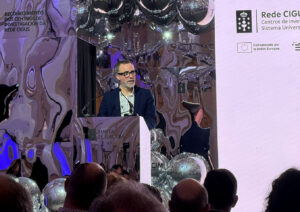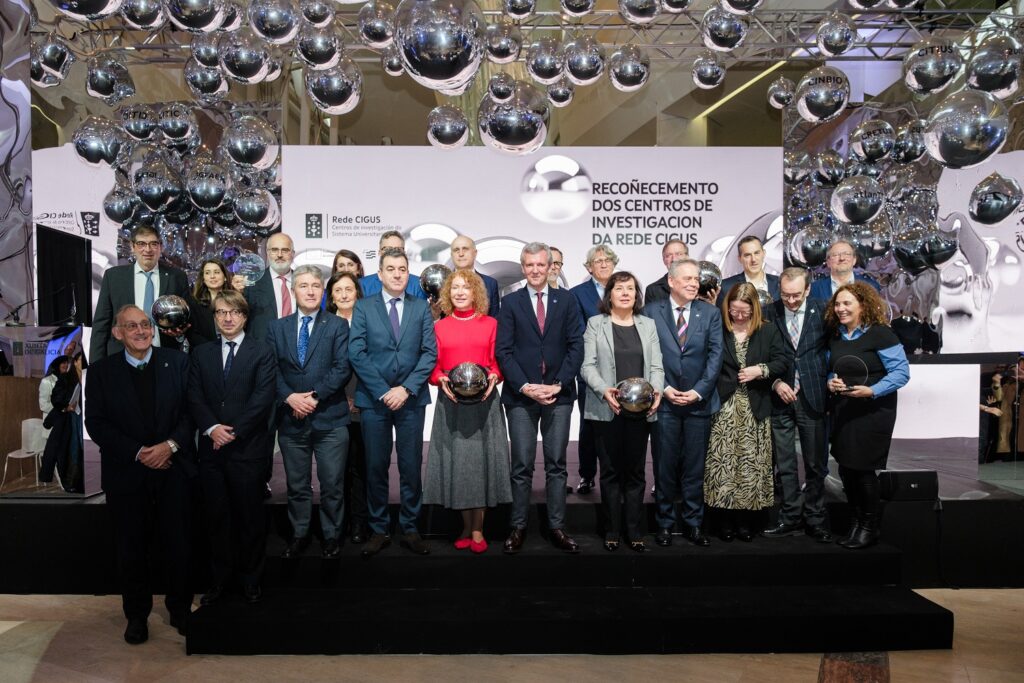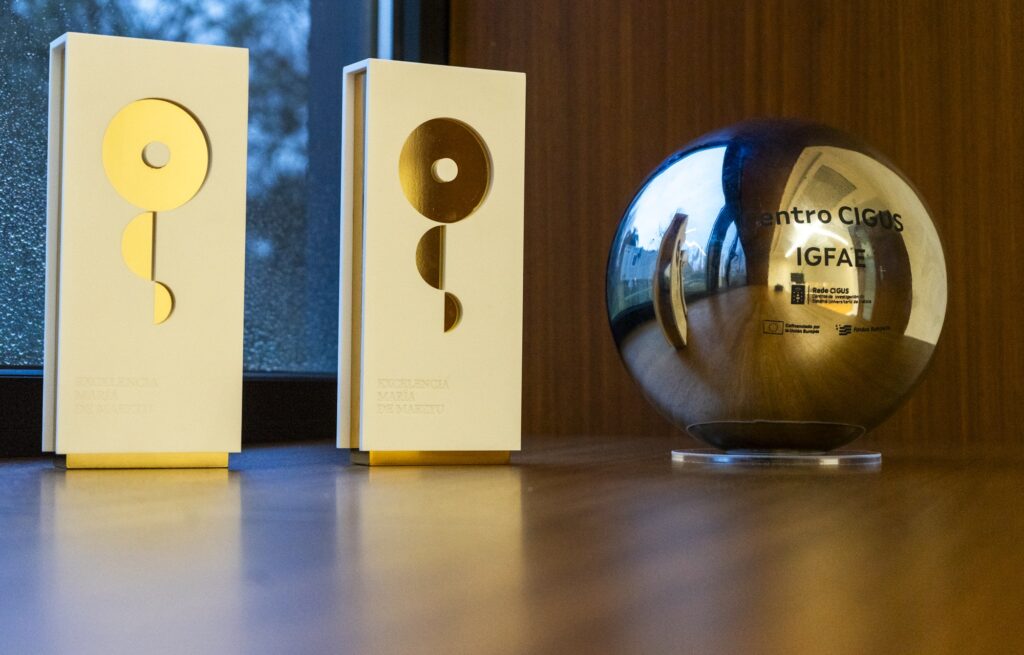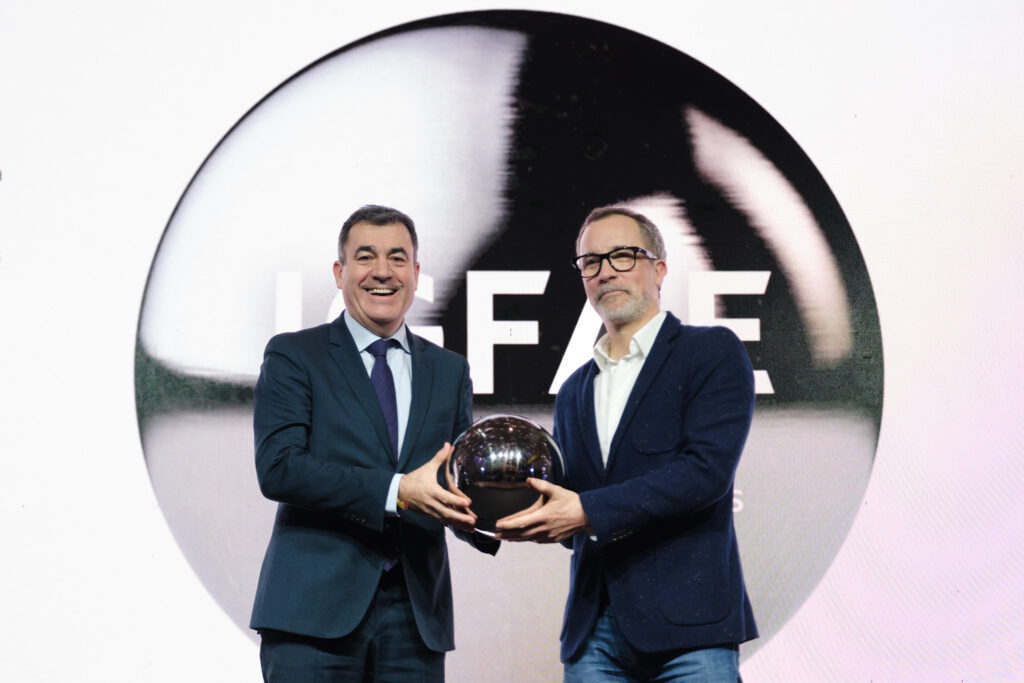A large representation of the staff of the Instituto Galego de Física de Altas Enerxías (IGFAE) attended on Tuesday 11 February the ceremony of recognition of the 10 research centres that form the CIGUS network, held at the Museo de la Cidade da Cultura de Galicia, in Santiago de Compostela. The director of the IGFAE, Carlos Salgado, received from the Regional Minister of Education, Science, Universities and Vocational Training, Román Rodríguez, the distinction that represents the membership of CIGUS, a network of which the IGFAE has been part since the first call, in 2019, and which accredits the quality and impact of the research carried out at the Institute.
 In his speech, Carlos Salgado expressed his gratitude to the Xunta de Galicia and the University of Santiago de Compostela, as well as to the staff of the centre. He stressed the need to nurture scientific talent in research centres, providing ‘the necessary conditions to identify, train and cultivate this talent’, with ‘resources for hiring and infrastructure, among other actions’. On this point, he referred to the CIGUS network as ‘the basis that allows these structures to function’, defining it as ‘a huge success story, and a great achievement of the scientific policy of the last decade, which must be strengthened and complemented with other measures both to attract talent at the highest level, and infrastructure, as well as adapting regulations to an environment of maximum international competition,’, Carlos Salgado concluded.
In his speech, Carlos Salgado expressed his gratitude to the Xunta de Galicia and the University of Santiago de Compostela, as well as to the staff of the centre. He stressed the need to nurture scientific talent in research centres, providing ‘the necessary conditions to identify, train and cultivate this talent’, with ‘resources for hiring and infrastructure, among other actions’. On this point, he referred to the CIGUS network as ‘the basis that allows these structures to function’, defining it as ‘a huge success story, and a great achievement of the scientific policy of the last decade, which must be strengthened and complemented with other measures both to attract talent at the highest level, and infrastructure, as well as adapting regulations to an environment of maximum international competition,’, Carlos Salgado concluded.
The research centres that form part of the CIGUS Network are five from the University of Santiago de Compostela, three from the University of Vigo and two from the University of A Coruña. At the USC, in addition to the IGFAE, the Singular Centre for Research in Biological Chemistry and Molecular Materials (CIQUS), the Singular Centre for Research in Molecular Medicine and Chronic Diseases (CIMUS), the Singular Centre for Research in Intelligent Technologies (CITIUS) and the Centre for Interdisciplinary Research in Environmental Technologies (CRETUS) were recognised. For the University of Vigo, the Centre for Research in Telecommunication Technologies (AtlanTTic), the Centre for Research in Nanomaterials and Biomedicine (CINBIO) and the Centre for Marine Research (CIM). And for the University of A Coruña, the Centre for Research in Information and Communication Technologies (CITIC) and the Centre for Advanced Scientific Research (CICA).

The CIGUS accreditation will provide the IGFAE with funding of nearly three million euros until 2027, which will allow the Institute’s strategic plan to be consolidated over the coming years. To achieve this recognition, the Institute passed the evaluation of an external committee, which assessed very positively the work of the IGFAE in aspects such as governance, structure, scientific quality and the transfer of results to society.
The distinction of regional Galician government is thus added to the accreditation as a María de Maeztu Unit of Excellence, awarded by the State Research Agency from the Spanish Government, obtained by the IGFAE in 2017 and 2024. So far, it is the only centre in Galicia recognised with this prestigious award, which will provide 2.6 million euros over the next few years, promoting a new stage in the transformation of the Institute. Since the first award, in 2017, the IGFAE has undergone a profound transformation that has boosted the growth of the centre, both in its organisation and in its scientific structure and performance.

Both awards of excellence have been accompanied by the construction of the IGFAE’s new headquarters. In this first third of 2025, the transfer of staff to the premises located in the Monte de la Condesa building will be completed, with which the Institute will increase its current surface area by 70%, incorporating new experimental laboratories, common work spaces and areas for outreach activities.
About the IGFAE
The IGFAE, a joint centre of the University of Santiago de Compostela and the Xunta de Galicia, was founded in 1999 with the main objective of coordinating and promoting scientific and technical research in the field of Particle, Astroparticle and Nuclear Physics and related areas. One of the pillars of its solid trajectory is based on its participation in international infrastructures such as CERN, GSI / FAIR, GANIL, the Pierre Auger Observatory, LIGO, NEXT, DUNE or HyperK. It is currently made up of a team of around 140 people, including scientific, technical and management staff.
